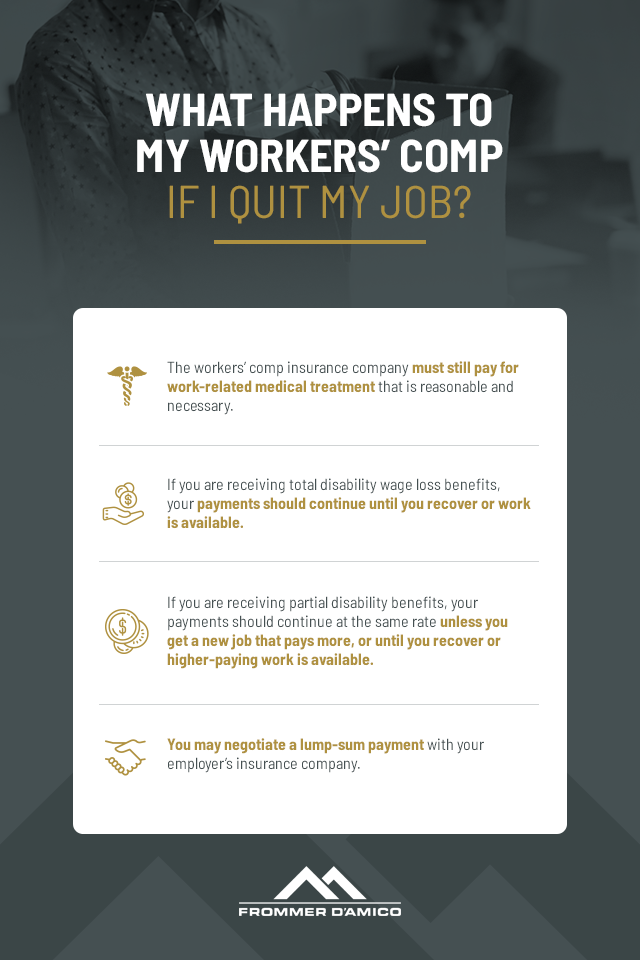Table of Contents:
- How Does Workers’ Compensation Work in Pennsylvania?
- What Does Workers’ Compensation Cover?
- Will I Lose My Workers’ Compensation Benefits After Quitting?
- When Should I Consider Quitting?
- What Is Forced Resignation?
- Can I File for Workers’ Compensation After I Quit My Job?
- Contact Frommer D’Amico
If you are getting workers’ compensation benefits in Pennsylvania, it doesn’t mean you are locked into your employment. You can quit your job after suffering a work-related injury, and it shouldn’t automatically disqualify you from workers’ compensation benefits.
In Pennsylvania, workers’ compensation claims are based on your status of employment when the injury occurred. If you were employed at the time of the work-related injury and you qualify for workers’ compensation, you should be eligible for benefits.
Infographic – What Happens if I Quit?
Your employer will argue you are not entitled to benefits because you voluntarily quit your job. You will have to show that you left because of your work injury. Also, quitting a job can complicate your eligibility for unemployment compensation benefits in Pennsylvania. There are many aspects of your workers’ comp claim that could be changed because you quit your job.
How Does Workers’ Compensation Work in Pennsylvania?
Under Pennsylvania’s Workers’ Compensation Act, your employer is required to pay for workers’ compensation insurance for you as long as you are employed. The insurance covers medical expenses and wages lost resulting from a work-related injury.
Most employers in Pennsylvania, even those that only have one employee, are required to carry workers’ compensation insurance. There are some exceptions to this rule, and some employees, such as railroad workers or federal employees, may not be covered under the Act. For the most part, an employee at any business in Pennsylvania is covered by workers’ compensation.
Workers’ compensation in Pennsylvania is a no-fault system. This means it does not matter if you or your employer are responsible for your work-related injury — you are eligible for workers’ compensation. If you take part in the workers’ compensation system, you cannot sue your employer.
Additionally, you don’t have to be injured in your workplace if you are injured while you are doing your job. For instance, if a truck driver employed by a company in Pennsylvania drives throughout the Northeast and suffers an accident while driving for the company in Massachusetts, the Pennsylvania employer is still required to pay workers’ compensation. The important thing is to be able to show that your injury happened while you were doing a work-related activity, regardless of where that work took place.
What Does Workers’ Compensation Cover?
Under workers’ compensation, you are entitled to three basic benefits:
1. Wage Replacement
If your doctor says that you should not work at all and your employer accepts your claim, workers’ compensation will pay you two-thirds of your average weekly wage up to a maximum. In Pennsylvania, the most a worker can receive in 2024 is $1,325 a week. This is known as a total disability benefit, which you are eligible for until you recover and can return to work. You can receive workers’ comp benefits indefinitely.
Depending on your injury, your doctor may say you can be placed on light or limited work duty, which is considered a partial disability. If you have suffered a partial disability, you are eligible to receive payments at lower wages for your work-related injury for up to 500 weeks.
2. Medical Treatment
Workers’ compensation covers medical expenses that relate to your work injury, including doctors’ visits, prescriptions or medications, any specialized medical treatments you might need, physical therapy, emergency room visits and X-rays or MRIs. You may receive medical benefits through workers’ compensation if the care is needed, related to the work injury and considered reasonable and necessary.
Workers’ compensation benefits will not cover pain and suffering, such as emotional distress, caused by the work-related injury. If the injury was caused by a third party, such as a manufacturer that provided a defective machine, you may also have a personal injury case, which could lead to compensation for pain and suffering. An experienced workers’ compensation lawyer can evaluate your case and determine if your injury warrants litigation.
3. Specific Loss or Disfigurement
You may suffer from a specific loss, such as limb loss, resulting from the work injury. You are entitled to periodic payments or a lump sum to compensate you for your loss. A specific loss benefit is calculated using a special schedule that guarantees you so many weeks of compensation depending upon the percentage of loss in your body part and will be paid to you regardless of whether you return to your job or find another job.
If you suffered a disfigurement resulting from the injury, you may be awarded an agreed-upon amount for up to 275 weeks.
Will I Lose My Workers’ Compensation Benefits After Quitting?
If you decide to quit your job after you have filed a workers’ compensation claim, you will still receive medical benefits depending on a doctor’s evaluation of your condition. If you have suffered a total disability, your payments should continue, and if your injury falls under the special loss guidelines, you can still receive those payments or negotiate a lump sum payment with your employer’s insurance company.
You should also continue to receive wage-loss benefits if you have a partial disability and accept employment elsewhere — if you are unable to earn pre-injury wages due to the disability for a period of up to 500 weeks. You may lose your right to receive wage replacement benefits for a partial disability if you voluntarily quit your job and do not seek employment but can work.
Your former employer can request that your workers’ compensation benefits be reduced or stopped if they can prove suitable work is available to you but you choose not to pursue employment. A judge will decide whether you will continue to receive benefits.
When Should I Consider Quitting?
There may be situations when it makes sense to leave your job. For instance, if your employer gives you a new job based on the restrictions that your doctor has outlined in your treatment plan, but the work is tedious and unrewarding, and you know you could probably earn more money if you applied for another job, it may make sense to leave your current position.
Remember, if you leave, you will still be eligible for medical benefits through workers’ compensation from your previous employer if you were injured while working for them, but you may lose wage-loss benefits.
You might also consider leaving your job if you feel uncomfortable or unsafe there. In this case, it may be possible for you to retain your workers’ compensation benefits if you can prove the workplace is unsafe. Speak to an experienced workers’ compensation lawyer as soon as possible if this is your situation. An attorney can help you gather specific evidence to prove allegations about an unsafe workplace and demonstrate that you left your job with just cause.
What is Forced Resignation?
You may not want to leave your job but feel that your employer is trying to force you to quit. It’s essential that you know the workers’ compensation rules about this topic:
- It is unlawful for an employer to discriminate against you for filing a workers’ compensation claim, and they cannot fire or terminate you because you filed a claim.
- It is also illegal for an employer to try to force you to resign because of your workers’ compensation claim.
- You can lose your job while you are on workers’ compensation for reasons not related to the claim.
Employers and insurance companies can come up with many excuses to terminate an employee’s position while they’re collecting workers’ compensation benefits. They may argue that they had layoffs planned before the injury occurred or say company standards weren’t being met, and they were planning on terminating employees anyway.
Even if your company doesn’t try any of these tricks, they can still try to force you to quit your job. They can intentionally give you a restricted or a limited job that they know you will not like, or they can make your work life so difficult that you will not want to stay. Employers know that if an employee leaves voluntarily, there’s less of a chance they will have to pay full workers’ compensation benefits.
If you believe that your employer’s treatment has forced you to resign, this is not the same situation as voluntarily leaving. Pennsylvania law protects employees from discrimination and retaliation, so if your employer creates a work environment that is so hostile and miserable that any reasonable person would want to quit, you might consider taking legal action with an attorney’s help.
If you believe that your employer has forced you to resign, however, and you can show that their treatment of you forced you to make that decision, this is not the same situation as an employee who voluntarily leaves the job. According to the law, if your employer forces you to quit or creates a work environment that is so hostile and miserable that any reasonable person would not want to continue being employed in that situation, this is the same as termination, and it is illegal.
Again, if you find yourself in this situation, talk to a workers’ comp lawyer as soon as possible. If you feel that your employer has forced you to resign, you should still retain your right to all of your workers’ compensation benefits.
Can I File for Workers’ Compensation After I Quit My Job?
You can file a workers’ compensation claim after you quit your job as long as you follow Pennsylvania’s statute of limitations for reporting a work-related injury. Notice of your injury must be given within 21 days or no compensation may be awarded until your employer is officially notified. You have up to 120 days to notify your employer of the work-related injury to receive any compensation. If you fail to notify your employer of a work-related injury after 120 days, in most cases, your claim will be denied or not even considered.
There can be exceptions to this, but you should talk with an experienced workers’ compensation attorney if you were injured on a previous job but have failed to notify your former employer within the 120-day timeline.
Know that if you quit your job before filing a workers’ compensation claim, it can be more difficult to prove your claim, and it may face more scrutiny. Employers and insurance companies are very suspicious when employees make claims after they quit a job. They see this as a way for a former employee to collect a weekly wage even though people who voluntarily leave their jobs are not eligible for unemployment benefits.
To prove your injury took place at your previous job, you may need to provide a statement from a coworker or superior who witnessed your accident. There may be video footage that is available from your workplace that you might use, if needed, to support your claim or fight a denied claim. If you quit, it could be challenging to access your former workplace or gather evidence in a timely manner.
It is always important to report an accident to your employer or supervisor as soon as it happens. You should do it even if you are thinking about leaving your job. Under Pennsylvania law, that notification needs to be given to your supervisor or manager. You cannot casually mention to a coworker that you may have hurt yourself. That is not considered a notification.
Speak to an Attorney Before You Quit
Your best option is to speak with an experienced workers’ compensation attorney if you are considering quitting your job due to injury at any point before or after filing your workers’ comp claim. An attorney can review your reasons for wanting to quit and offer representation as well as legal advice. If you’re considering leaving your job because you face discrimination or problems arise as a result of your workers’ compensation filing, your employer may not be acting in good faith and may even be breaking the law.
In Pennsylvania, you are protected under the law and should not be fired for filing your workers’ compensation claim or feeling pressured because of how you are being treated at work. A Pennsylvania workers’ compensation attorney can review your legal options. If you’re considering quitting because you are injured or don’t enjoy your job anymore, an attorney can work with you to ensure your change in employment status doesn’t impact your benefits.
Contact Frommer D’Amico
If you need to speak to a workers’ compensation attorney, contact Frommer D’Amico. We are a team of certified Pennsylvania workers’ compensation specialists who strive to deliver personalized attention. We will work hard to ensure you get the benefits you are entitled to and resolve any issues, such as late checks or delays.
While many attorneys offer a free initial consultation, we also offer free case management, potentially saving you thousands of dollars to make sure more of your compensation check ends up where it should — in your pocket. Contact us today for a consultation.

Joe D’Amico has more than 20 years of experience fighting for injured workers. He is Certified as an Expert in Pennsylvania Workers’ Compensation Law by the Supreme Court of Pennsylvania. Joe is one of the very few Pennsylvania workers’ compensation attorneys who have obtained a recovery in excess of $1.5 million for an injured worker.
Reviewed by Joe D’Amico.






